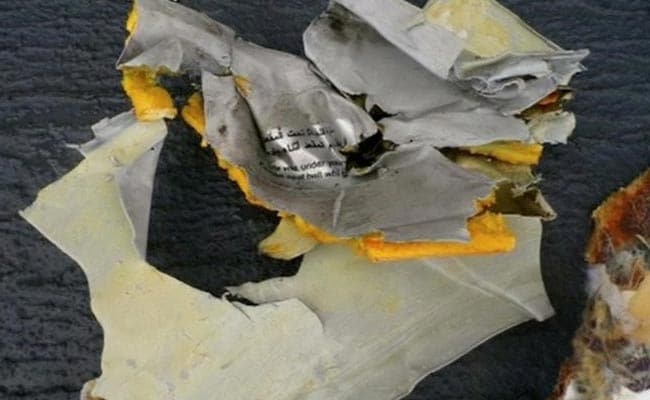
- The signals didn't indicate what caused the smoke, said officials
- A fire likely to activate signals but not ruling out explosion: Sources
- The flight with 66 people on board crashed in Mediterranean on Thursday
An EgyptAir jet sent a series of signals indicating that smoke had been detected on board before it crashed into the Mediterranean on Thursday, France's air accident investigation agency said today.
A spokesman for the BEA agency said the signals did not indicate what caused the smoke or fire on board the plane, which plunged into the sea with 66 people on board as it was heading from Paris to Cairo.
But they offered the first clues as to what unfolded in the moments before the crash.
One aviation source said that a fire on board would likely have generated multiple warning signals, while a sudden explosion may not have generated any - though officials stress that no scenario, including explosion, is being ruled out.
Egypt said its navy had found human remains, wreckage and the personal belongings of passengers floating in the Mediterranean about 290 km (180 miles) north of Alexandria.
The army published pictures today on its official Facebook page of the recovered items, which included blue debris with EgyptAir markings, seat fabric with designs in the airline's colours, and a yellow lifejacket.

Recovered debris of the EgyptAir jet that crashed in the Mediterranean Sea is seen with the Arabic caption 'life jacket under seat' in this still image taken from video on May 21, 2016. (Egyptian Military/Handout via Reuters TV)
Analysis of the debris and recovery of the black boxes are likely to be key to determining the cause of the crash - the third blow since October to Egypt's travel industry, still reeling from political unrest following the 2011 uprising that ousted Hosni Mubarak.
A suspected Islamic State bombing brought down a Russian airliner after it took off from Sharm el-Sheikh airport in late October, killing all 224 people on board, and an EgyptAir plane was hijacked in March by a man wearing a fake suicide belt.
The October crash devastated Egyptian tourism, a main source of foreign exchange for a country of 80 million people, and another similar incident would crush hopes of it recovering.
Hunt For Black Boxes
The signals from the plane "do not allow in any way to say what may have caused smoke or fire on board the aircraft," said a spokesman for the French BEA agency, which is assisting an official Egyptian investigation.
He added that the priority now was to find the two flight recorders, known as black boxes, containing cockpit voice recordings and data readings, from the Airbus A320 which vanished from radar early on Thursday.
The plane is believed to have come down in a deep part of the Mediterranean, in 2,000 to 3,000 metres of water, according to a person familiar with Western naval estimates.
That would place the black box locator beacons, which last for 30 days, on the edge of their detectable range from the surface using acoustic equipment typically used during the first stages of a search, according to a report into the 2009 crash of an Air France jet in the Atlantic.

The French Navy's EV Jacoubet prepares to leave the Mediterranean port of Toulon, France on May 20, 2016 in this picture taken and released on Friday by the French Navy SIRPA Marine, to take part in a search operation of the EgyptAir passenger plane.
Track Latest News Live on NDTV.com and get news updates from India and around the world

